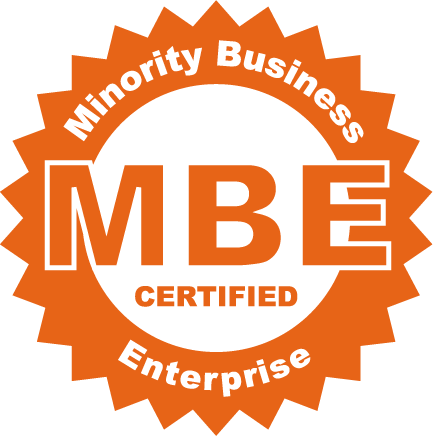 As a Minority Business Owner, you know firsthand what it has taken to found and grow your company. In the beginning, you are not only the owner but likely it’s head salesperson, chief marketing officer, HR department, and more; the list goes on. You know the hard work that it takes to be in a position to be a supplier to large corporations. You understand that being a diverse business brings certain benefits and advantages to your clients and you know how to demonstrate them. If you have taken full advantage of MBE certification, you are also aware of all that the NMSDC has to offer in order to help you grow your business.
As a Minority Business Owner, you know firsthand what it has taken to found and grow your company. In the beginning, you are not only the owner but likely it’s head salesperson, chief marketing officer, HR department, and more; the list goes on. You know the hard work that it takes to be in a position to be a supplier to large corporations. You understand that being a diverse business brings certain benefits and advantages to your clients and you know how to demonstrate them. If you have taken full advantage of MBE certification, you are also aware of all that the NMSDC has to offer in order to help you grow your business.
As you grow and add staff, you lose some of those titles, someone else takes over those responsibilities, which is a good thing, but it also presents a challenge. While you may be well versed in explaining the benefits of working with an MBE supplier to others, is everyone at your firm? You may understand the ins and outs of corporate procurement and supplier diversity programs, but now that you’re not the only salesperson, do your sales people know?
If you continue as the primary spokesperson in the diversity business community, are others at your firm aware of your efforts and how they can support or leverage them? You also never know when or who might have an opportunity from your company to speak with a potential client. Networking opportunities can be unpredictable. And there is no guarantee that those someone might speak with know these things either.
It would seem then like a good idea that everyone in your company, at the very least your sales people and account managers, understands what it means to be an MBE, the benefits of diversity and a diverse supplier base, and how to differentiate your company in this way when it’s appropriate. Make sure they know how to work with procurement and program managers at large corporations – share your knowledge.
I’m not suggesting anyone is intentionally hoarding knowledge or power, just that it is easy to get busy and forget how important this can be. I certainly know how valuable it can be from working with our CEO Jerry Brenholz and benefitting immensely from his counsel and willingness to share. And I recently started a project that began with me being reminded of the importance of sharing information; it’s the impetus for this post
My role has generally been outward facing, working to promote ATR, to increase our connection to others in the MBE community, and to support other MBEs and the organizations that help us. But I’ve also turned my efforts inward. In recent years, I’ve increased my efforts to work with our sales people and account managers in suggesting networking and training events, usually through the NMSDC and its regional chapters, that I think can offer them good opportunities to connect with corporate buyers.
But it occurred to me that I could do more. I’m only one person and can only do so much, but by sharing my knowledge, I can leverage it. I realized that not everyone had a full understanding of what it means to be an MBE or how to explain those benefits and promote ATR to potential customers. After consulting with colleagues, I decided to develop a training program for new employees (or anyone else that would like to attend!).
This is still a work in progress. As I’ve held the first few sessions, I’m refining what we cover and the presentation and materials that I use. But the response has been very, very positive and because of that, I wanted to share it with you.
In our training we covered these main points:
-
Our MBE status and what being certified means – make sure that everyone understands the basics about being an MBE and what that means in terms of attracting clients and finding opportunities. In my experience so far, people often had a vague or incomplete picture of what an MBE is and how being certified works.
-
The benefits of working with diverse suppliers – likewise, people generally know that diversity is beneficial but often don’t fully understand how or why and don’t know how to explain those benefits to others.
-
The NMSDC and the benefits that are available along with certification – in addition to training and research opportunities, there are numerous opportunities to meet and network with companies seeking MBEs. If your sales people participate and take advantage of these things it can really make a difference.
-
Tips for meeting and building relationships with diversity program and procurement managers – ensure that your sales people know the difference between the procurement and supplier diversity manager; their goals and responsibilities overlap but are also very different. Building good relationships with both leads to more opportunities.
-
The ins and outs of working with corporate programs – make sure everyone understands the basics of how to work with corporate programs: the need to register as an MBE, basic process and procedures, their RFP process, etc.
I’ve found people are really happy to have this information and that most just didn’t realize all of the ways they can use our MBE status as a supplement to other efforts to differentiate and distinguish our company with potential clients. Whether it was a simple tip like branding our company as an MBE on their LinkedIn page or providing the facts on the benefits of diversity, they appreciated the information. Good sales people want every advantage they can get!
Part of the training included the ways in which I can partner with them and help them take full advantage. In addition to their own initiative in tracking events, I promised to look at upcoming networking opportunities and let them know when something appropriate was going on in their area. I also meet a lot of program managers and other corporate contacts in my work, which means that I’m a good networking source and can facilitate introductions and alert them to opportunities they might not otherwise know about.
You’ll of course want to tailor your training to the specifics of your company. Depending on your role, the size and tenure of your company, and how you use and market your MBE status, your efforts may be different than mine. If you are a newer, smaller MBE, it may simply mean, as the owner, sharing your efforts and knowledge with your team. A larger, more well established MBE may have resources and the need for something more formal like my role and my newly founded training.
The key takeaway is that you should be using your MBE status to help grow your company, and while your senior leadership probably are, everyone else should know how to do so too. A little training can go a long way and make a big difference. Good luck getting the most out of being an MBE!
Angelique Solorio
Corporate Outreach Manager, Supplier Diversity


Leave a Reply